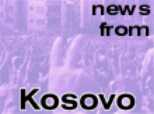Car bomb in Pristina
A car bomb explosion in the centre of Pristina near Yugoslav government offices Wednesday killed one person and injured five others, the United Nations Mission in Kosovo (UNMIK) reported. The victims were identified as employees of the Yugoslav government office in Pristina.
"For the future of Kosovo it could not be a more tragic incident," UN police spokesman Derek Chappell said. "This is an attack against everything that people trying to build this country are working for."
Outrage
"This is an outrage," said Hans Hækkerup, head of the UNMIK. "I am deeply saddened by the continued violence in Kosovo, despite our best efforts to bring peace and security to all people."
The OSCE also condemned the act of "senseless terrorism" in Kosovo. "Violence like this is aiming to undo any progress we make. But we at the OSCE will not be deterred. We are working to build a democratic future for Kosovo, where there is no place for terror and butchery," said Ambassador Daan Everts, head of the OSCE Mission in Kosovo.
Tax protest
NATO-led troops in Kosovo dismantled three roadblocks set up by Serbs in protest against a new tax on goods entering the province from elsewhere in Yugoslavia.
NATO spokesman Roy Brown said they were acting to re-establish freedom of movement for all people of Kosovo, as well as UN and NATO traffic. The troops used tear gas at one of the three roadblocks established at northern boundary-area towns of Zvečan, Zupče and Ložiste.
Serbs in north Kosovo blocked roads in protest at a new tax imposed by the United Nations on goods from Serbia. Serbs are opposed to a 15-percent tax which the UN administration has slapped on all goods coming into Kosovo from Serbia proper, except fruit, vegetables and flour, and another tax on alcohol and cigarettes.
Separate tax equals separate politics?
The Serbs say the taxes could mark a first step towards the "gradual creation of an independent state of Kosovo".
The Serbian Parliament in Belgrade issued a statement attacking the UN administration's "one-sided" imposition of new taxes, saying they could "lead to more suffering and the exodus of the Serb and other non-Albanian populations from the province".
The UN administration, tasked with re-establishing Kosovo's autonomy after it was scrapped more than a decade ago by former Yugoslav President Slobodan Milošević, has been trying to rebuild the province's ruined economy, in part by levying duties on its borders.
Hostages released
In a step intended to defuse tensions and allow peace talks to resume, NATO peacekeepers have handed over to Yugoslav authorities five Serbs held by ethnic Albanian rebels in Kosovo for more than a month. The three civilians and two Yugoslav army officers were abducted in March in the buffer zone bordering Kosovo.
The men walked with NATO peacekeepers who handed them over to Serbia's deputy prime minister, Nebojša Čović, at the Merdar border checkpoint with Kosovo.
NATO's chief representative for Yugoslavia, Shawn Sullivan, said the hostage release was the culmination of several weeks of intensive work on behalf of KFOR.
Easier to talk without hostages
"The commander of KFOR is very happy that we are returning these five Serbs to their families and their government," Sullivan said. "I think that this is a chance for both sides to reach a peaceful solution to the problem." NATO welcomed the release "as a good and important humanitarian gesture and a decisive step towards a political resolution of the current tensions." Čović said peace talks would resume with the rebels, but he was less optimistic.
Weapons amnesty
The second phase of the program Weapons Amnesty Program will be launched in May after UNMIK head Hans Hækkerup signed the Executive Decision on the Weapons Amnesty.
The Amnesty Program will allow the citizens of Kosovo to surrender all weapons during an amnesty period, from 1 May to 3 June, without fear of prosecution.
Any person in Kosovo who possesses a weapon without valid authorization may surrender the weapon to law enforcement authorities without having to give any information. If persons are found in possession of unauthorized weapons after the amnesty deadline, they will be liable to prosecution and imprisonment for up to ten years and/or fined up to DEM 20,000.
KFOR and UNMIK Police will designate one stationary weapons collection point in each of the five regions in Kosovo. There will also be mobile weapons collection units that travel to specific villages.
Election date getting clearer
Legislative elections leading to the formation of Kosovo's first government will be held in late October or early November, UN administrator Hans Hækkerup said Sunday.
Hækkerup also said that Serbs who have fled the Yugoslav province, mostly due to revenge attacks from the ethnic Albanian majority, will return to the province before the elections.
"The elections in Kosovo that are expected to be held by the end of the year are very important and will help stability in the Balkans," said Hækkerup during a visit to neighbouring Albania. "It belongs to the Kosovo people and their political leaders to manage their problems by themselves," he said.
Justice still elusive
A report produced by the Organization for Security and Co-operation in Europe (OSCE) Mission in Kosovo said that problems continue to hamper the development of a fair criminal justice system.
The report calls for urgent and strategic action to bring the criminal justice system into line with international human rights standards.
"We have seen some developments since we published our last report, six months ago," said Rolf Welberts, the OSCE 's director of the Human Rights and Rule of Law Department. "But there are some major problems still to be dealt with. Some can be overcome with training; others are more systemic."
Llazar Semini, 20 April 2001
Moving on:
- Archive of news reviews for Kosovo
- Browse through the CER eBookstore for electronic books
- Buy English-language books on Kosovo through CER
- Return to CER front page




